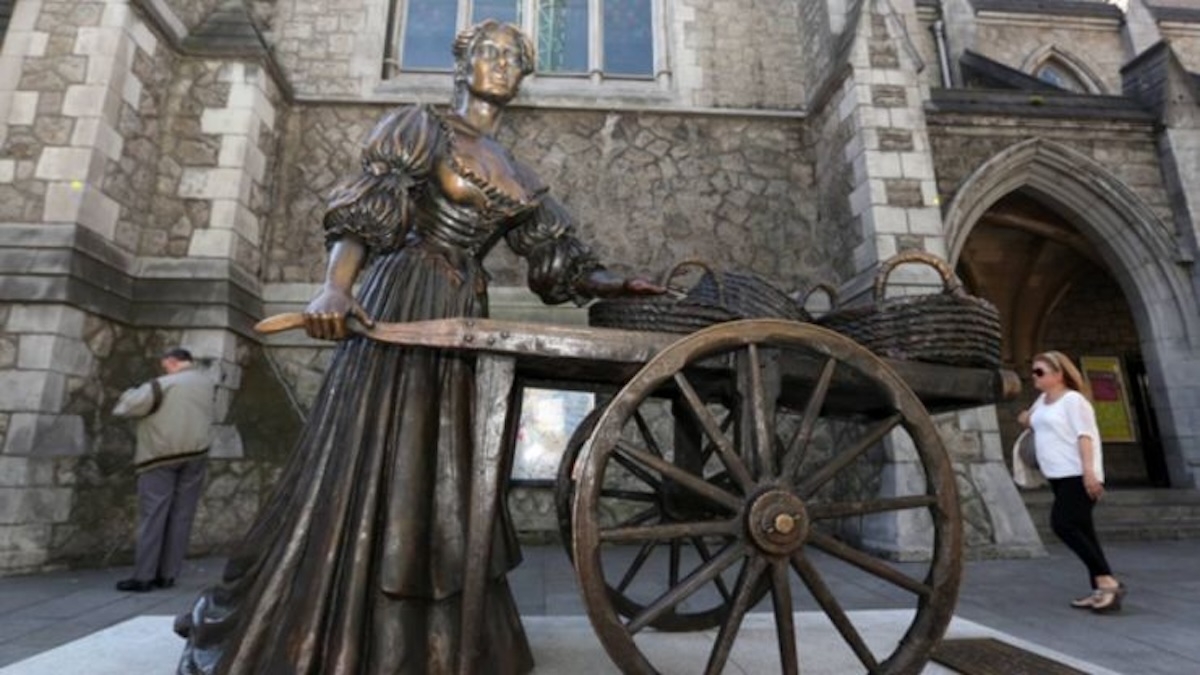
The death of a homeless man of suspected hypothermia near one of Dublin’s main tourist attractions has refocused attention on the profound failure of the coalition government to tackle the homelessness and housing crises.
The man’s body was found in the early hours of Tuesday morning at a disused former church, St Andrew’s Church in St Andrew’s Street. He died just feet away from the statue of Molly Malone, a fictional fish merchant from a well-known 19th century song.
The building where he died was recently used as the main tourist information centre in the city but is now, like tens of thousands of other properties around the country, inexplicably vacant and increasingly derelict.
Gardaí police have yet to identify the man, who was found dead in what was once the church porch. A Department of Housing spokesperson said the discovery of the man’s body was a “tragedy” and extended sympathies to the man’s family.
In a post on Facebook, the ‘A Lending Hand’ charity said the tragic death was predictable and warned that there will be more deaths unless more adequate and safe accommodation is provided.
“One of our pals lost their life on the streets this morning,” they wrote.
“To say we are absolutely devastated is an understatement. We knew this would happen when people are taking their chances on the streets in freezing temperatures because the hostels are worse than the streets.
“RIP Pal we hope you get the best bed in heaven [and] a safe bed – more than what was provided to you while you were on this earth.”
His death comes amid a catastrophic shortage of housing and accommodation. The most recent homelessness figures in the 26 County show that for the month of November, 13,514 people are now without homes, 4,105 of these are children - a new record. There has been a 55% increase in the number of people living in emergency accommodation in the lifetime of the current coalition government.
The right-wing Fianna Fáil Minister Darragh O’Brien has put his energies into offering tax breaks to landlords and sweetheart deals to select developers.
A new scandal erupted this week when it was reported that that around 85% of homes in a new housing estate in Dublin, which were originally advertised to be sold to private individuals, have instead been secured by a British investment fund, a ‘vulture landlord’.
Rents have doubled in just over a decade and continue to climb amid an extreme shortage of properties. House prises in Dublin have been allowed to increase uncontrollably to a stratospheric average cost of €430,000, a price which mortgage lenders say is unaffordable for the vast majority of residents, including members of the Dublin parliament.
For workers on ordinary and modest incomes, the dream of owning their own home is beyond reach. Many are forced to turn down work due to lack of suitable accommodation nearby or else face long and exhausting commutes.
A new Sinn Féin proposal to bring down the price of a new home to an average of €300,000 in Dublin has received a surprisingly high level of public support. According to an opinion poll this week, 63pc of people would like to see property prices fall even if it meant their own home dropped in value.
The poll also showed that most people, 52%, now identify housing as the most important issue facing the 26 County state. The Sinn Féin Dublin Mid-West TD and housing spokesperson Eoin Ó Broin hit out at the deepening crisis.
“How long will Fianna Fáil and Fine Gael allow these homeless numbers to increase?” he asked.
“Since the current government was formed homelessness and child homelessness has increased by a shocking 55%. It is now clear that the longer Fianna Fáil and Fine Gael are in office the worse the housing and homelessness crisis will get.”
Eirigi accused the 26 County government of abandoning their responsibility to directly provide housing to the people, and funnelling resources from those who are income and asset poor, to those who are already income and asset rich.
“They have chosen to put landlords, property developers, speculators, bankers, estate agents and other parasitic profiteers in effective control of the housing sector, with predictably disastrous results,” they said.
“Fianna Fáil, Fine Gael, the Labour Party and the Green Party made these choices because they all share a fanatical belief in the private sector and profit-driven market economics.
“Darragh O’Brien needs to accept that this market-led approach to housing is making the situation a whole lot worse, not better. A radical shift to a system of Universal Public Housing would start to deliver real results within a couple of years, but more importantly it would give people real hope straight away.”
![[Irish Republican News]](https://republican-news.org/graphics/title_gifs/rn.gif)
![[Irish Republican News]](https://republican-news.org/graphics/title_gifs/harp.gif)

